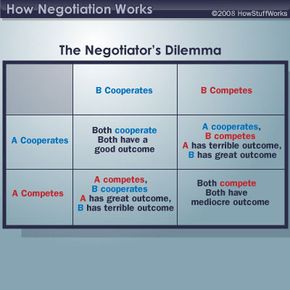"I'll gladly pay you Tuesday for a hamburger today." Does this sound like a good deal to you? The answer probably depends on how much extra interest you'll collect from me on Tuesday, if you trust me to pay and if you want to prevent bitterness from growing between us. If you're interested, you probably want to draw out or alter the terms.
Open the newspaper, and you'll find the latest conflict among world leaders, celebrity divorce or local labor union dispute. You may also hear a shout from the other side of the breakfast table that tells you it's not your turn to read the paper, but rather to take the dog for a walk. Conflict seems to be everywhere. It's one thing that's been with us throughout history. So, how do we get anything done without resorting to violence?
Advertisement
Whether it has to do with buying a car, divvying up errands or spreading world peace, negotiation is usually the best way to accomplish anything fairly. In general, negotiation is the process of resolving a dispute or settling a business deal.
But humans, though rational animals, are also emotional. Conflicting interests almost always involve more than the terms on the table. Between the lines, you'll find that people's motivations sometimes include anger, desires to maintain honor, saving face, or just plain greed. Effective negotiation takes strategy, tact, understanding and forethought. Theorists study and characterize the elements of fair and effective negotiation to find the best ways to resolve disagreements. We'll take a look at the different methods and explore theories about possible outcomes.
First, we need to recognize the steps involved in negotiation. How about this: If you'll agree to click to the next page, we'll tell you what they are.
Advertisement







